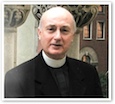Holy Trinity
- FATHER GEORGE W. RUTLER
Blessed Elizabeth of the Trinity was a French Carmelite who died in 1906, having lived only 26 years, but the greatest theologians would attest that she was their peer in apprehending the deepest mystery of the Faith.
 St. Thomas Aquinas said that his mystical encounter with the heart of heaven was so wonderful that everything he had ever written was "so much straw," which is saying a lot since his works are among the greatest thoughts ever recorded. So it is more appropriate to say that the Trinity is apprehended rather than comprehended, for God is beyond all human intelligence. But Jesus explains it: "I have called you friends, for everything that I learned from my Father I have made known to you" (John 15:15). So it is no surprise that even young Elizabeth of the Trinity was able to approach this mystery.
St. Thomas Aquinas said that his mystical encounter with the heart of heaven was so wonderful that everything he had ever written was "so much straw," which is saying a lot since his works are among the greatest thoughts ever recorded. So it is more appropriate to say that the Trinity is apprehended rather than comprehended, for God is beyond all human intelligence. But Jesus explains it: "I have called you friends, for everything that I learned from my Father I have made known to you" (John 15:15). So it is no surprise that even young Elizabeth of the Trinity was able to approach this mystery.
Saint Athanasius wrote:
"Even the gifts that the Spirit dispenses to individuals are given by the Father through the Word. For all that belongs to the Father belongs also to the Son, and so the graces given by the Son in the Spirit are true gifts of the Father. Similarly, when the Spirit dwells in us, the Word who bestows the Spirit is in us too, and the Father is present in the Word. This is the meaning of the text: My Father and I will come to him and make our home with him. For where the light is, there also is the radiance; and where the radiance is, there too are its power and its resplendent grace."
Having revealed the fact of the Holy Trinity, God left it to humans to find language capable of expressing it. So the Catechism explains: "In order to articulate the dogma of the Trinity, the Church had to develop her own terminology with the help of certain notions of philosophical origin: 'substance,' 'person' or 'hypostasis,' 'relation,' and so on. In doing this, she did not submit the faith to human wisdom, but gave a new and unprecedented meaning to these terms, which from then on would be used to signify an ineffable mystery, 'infinitely beyond all that we can humanly understand.'"
If that seems complicated, there is the prayer of the young Elizabeth of the Trinity:
O my God, Trinity whom I adore, help me forget myself entirely so to establish myself in you, unmovable and peaceful as if my soul were already in eternity. May nothing be able to trouble my peace or make me leave you, O my unchanging God, but may each minute bring me more deeply into your mystery! Grant my soul peace. Make it your heaven, your beloved dwelling and the place of your rest. May I never abandon you there, but may I be there, whole and entire, completely vigilant in my faith, entirely adoring, and wholly given over to your creative action.
 This is Meaghen Gonzalez, Editor of CERC. I hope you appreciated this piece. We curate these articles especially for believers like you.
This is Meaghen Gonzalez, Editor of CERC. I hope you appreciated this piece. We curate these articles especially for believers like you.
Please show your appreciation by making a $3 donation. CERC is entirely reader supported.

Acknowledgement
 Father George W. Rutler. "Holy Trinity." From the Pastor (May 23, 2016).
Father George W. Rutler. "Holy Trinity." From the Pastor (May 23, 2016).
Reprinted with permission of Father George W. Rutler.
The Author
 Father George W. Rutler is the pastor of St. Michael's church in New York City. He has written many books, including: The Wit and Wisdom of Father George Rutler, The Stories of Hymns, Hints of Heaven: The Parables of Christ and What They Mean for You, Principalities and Powers: Spiritual Combat 1942-1943, Cloud of Witnesses — Dead People I Knew When They Were Alive, Coincidentally: Unserious Reflections on Trivial Connections, A Crisis of Saints: Essays on People and Principles, Brightest and Best, and Adam Danced: The Cross and the Seven Deadly Sins.
Father George W. Rutler is the pastor of St. Michael's church in New York City. He has written many books, including: The Wit and Wisdom of Father George Rutler, The Stories of Hymns, Hints of Heaven: The Parables of Christ and What They Mean for You, Principalities and Powers: Spiritual Combat 1942-1943, Cloud of Witnesses — Dead People I Knew When They Were Alive, Coincidentally: Unserious Reflections on Trivial Connections, A Crisis of Saints: Essays on People and Principles, Brightest and Best, and Adam Danced: The Cross and the Seven Deadly Sins.




